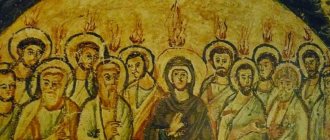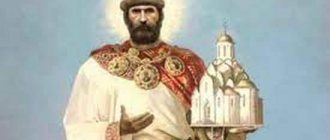The topic of missionary activity and the role of preachers in the spread of Christianity is always touched upon when studying the history of religion and the church. Jesus Christ is considered the first representative of this movement.
To become a real preacher, sincere faith is not enough. You still need to know a lot in order to be able to not only tell spiritually alien people about God, but also convince them of the truth of Christian teaching.
What is missionary
The concept of “mission” can be considered as a certain assigned task, function, task. If the term is used in a religious context, then its etymology and meaning will be somewhat different.
Origin of the term
The most famous missionary among people is the Apostle Paul, whose sermon letters addressed to the peoples of different countries contributed most to the spread of Christianity throughout the world.
The term was first used in the 16th century by the founder of the Jesuit order, Ignatius of Loyola. It comes from the Latin word missio, which means “message, task.”
Meaning of the concept
This is the name given to religious activities carried out to convert non-believers or apologists of other religions to their faith. Mission is not practiced in a religion that has strictly national roots, but in Christianity such activities are very widespread.
The rationale for the mission is contained in Christ’s address to the apostles:
“Go and make disciples of all nations, baptizing them in the name of the Father and the Son and the Holy Spirit” (Matthew 28:19).
All Christian denominations are working to disseminate the teachings. In the course of their missions, Catholics and Protestants emphasize attracting neophytes by any means, often using elements of local cults in worship. The Orthodox are ready to sacrifice part of their potential flock for the sake of preserving tradition, without resorting to any dubious “advertising campaigns.”
In Russian Orthodoxy, missionary work appeared in the 19th century, when the first society was created in St. Petersburg. His efforts were aimed at Christianizing the peoples of Siberia and the Tatars. Over time, Orthodox missions were founded far beyond Russia.
Restrictions
Let's consider what the law says about the ban on missionary activity. The standards establish that holding events by religious associations is not allowed in residential premises. However, there is an exception to this rule. The ban on missionary activity does not apply to cases provided for in Article 16 (Part 2) of the Federal Law, which regulates freedom of conscience and the work of religious associations. In particular, this refers to certain rituals (funeral services, for example). In general, if we talk about the ban on missionary activity, it is worth noting that the norms do not allow the study of religious literature or holding meetings with non-believers in residential premises. These citizens should not be present during rituals, services, or reading prayers. In residential premises, these activities can be carried out exclusively by believers. However, according to a number of experts, this norm contradicts the constitutional provisions establishing the rights of citizens.
History of missionary
The spread of Christianity and its achievement of the status of a world religion occurred, first of all, thanks to the activities of preachers. Who are missionaries and what do they do?
Appearance and distribution
In the early years the Church did not have an official institution engaged in preaching activities. However, examples of such ministry carried out by the apostles (disciples of Jesus Christ) are already mentioned in the Gospel.
Sacred Tradition claims that on Pentecost the Holy Spirit descended on the apostles, who from now on could carry the news of the risen Christ in all languages. Through the works of the first ascetics and their disciples, the Christian faith covered the entire Mediterranean over a century. By the time of the accession of Emperor Constantine in the 6th century, it had become dominant in all lands of the Roman Empire and in neighboring countries: Armenia, Mesopotamia and North Africa.
The Word of God was carried to many tribes and peoples by merchants, for whom, as we know, there are no borders, as well as by adherents of the new faith who were expelled from their native places or captured. When Christianity became the state religion of Rome, the emperors equipped their embassies to other countries to preach the Gospel.
During the power of Byzantium, the authority of its priests contributed to the spread of the faith. It was only in the 7th century that military defeats and an economic crisis forced the curtailment of government evangelization programs, which gave way to the activities of individual preachers. One of them was Saint Stephen of Sourozh, who brought the Good News to the Khazars and other peoples.
At the same time, the Christianization of the Balkan Slavs took place, sometimes by violent methods, as, for example, was the case in Bulgaria. In 863, this newly formed power was gripped by famine, and neighboring Byzantium offered its help in exchange for the baptism of the Bulgarians. The aristocracy rebelled, then Khan Boris executed representatives of 52 noble families who rejected baptism. Among those executed was the khan’s own son.
A huge role in preaching the Word of Christ was played by Saints Cyril and Methodius, who in the 9th century created the Slavic alphabet and writing. A century later, Kievan Rus was baptized, where liturgical books soon appeared in Cyrillic, and not in Greek.
Christianity came to Western Europe later. In the 5th century St. appeared in Ireland. Patrick. His disciples, Saints Columbus, Aidan and others, carried the Gospel to other nations. By the 7th century, Irish and Italian missionaries had converted the British to Christianity, and in the next century, Anglo-Saxon and Frankish ascetics such as Willibrord and Boniface began evangelizing the Scandinavian, Saxon and other Germanic tribes.
Medieval times
Charlemagne took over the baton of “state Christianization” from the hands of the Byzantine Empire. The Frankish king and then the emperor always provided missionaries with support, including military support. Charles attached great importance to the spread of Christian teaching throughout the vast territory of his empire, which covered all of Western Europe. Providing all possible assistance to the preachers, he simultaneously encouraged his subjects to study, master literacy, and also take an active part in the activities of the communities.
The victorious movement of the Church of Christ in the world was stopped by the invasion of Muslims. Having captured the Near and Middle East, as well as North Africa and practically exterminated Christians there, who were almost the majority in those places, the Arabs entered Spain. Although their onslaught in the north was stopped, much of Europe suffered for many centuries from attacks by the Arabs and Turks, which could only be countered by military force.
Therefore, the crusades of 1095-1291 were called upon not only to liberate the Holy Sepulcher, but also had the character of a mission to return Christianity to the lands of Palestine. When the crusaders were expelled from the conquered territories, the resources of Christian preachers were freed up to fulfill their main task - to bring the Good News to peoples who did not know Christ.
But it was not only Muslims who opposed the spread of Christianity. The Vikings became a real scourge for monasteries, centers and bases of activity for preachers.
Historians note that these sea robbers were a real curse for the peoples living on the coast of Europe. After their attacks in Ireland and Britain, only ruins remained of monasteries and temples. These raids were so frequent that they began to threaten the entire system of evangelism. In any case, during the years of greatest activity of the Vikings, the work of preachers practically ceased.
But there was another side to this problem. Through the efforts of monks sold into slavery, as well as Christian girls who were forced to become wives and concubines of northern bandits, many Vikings became Christians. They abandoned their pirate career and even began to preach the Gospel themselves.
Current situation
In modern times, organizations carrying the Good News have become more active against the backdrop of the development of the colonial appetites of Western countries and the intensification of the imperialist struggle for the redivision of the world. At the beginning of the 19th century, structures engaged in preaching work appeared in the United States, and by the end of the century, European missions on the African continent were actively operating.
They were financially supported by the administrations of the colonies, because, along with their main activities, they performed numerous social functions, being responsible for education, healthcare, and thereby carried out the policies of the governments of the colonial countries.
The Second World War and the subsequent destruction of the colonial system contributed to the beginning of the national liberation movement. Many colonies gained independence. Under these conditions, a radical restructuring of the entire mission system was required.
In the early 70s of the 20th century, almost 50 thousand members of Christian orders served in Africa alone. Most of the preachers, both monastic and civil, were not Africans. But by the beginning of the 80s, the Church changed its methods of work, focusing on the indigenous population. Theological schools were organized for Africans. Having been ordained, they formed a church hierarchy consisting mainly of local residents.
Liturgical texts were translated into the languages of local tribes, and elements of local rituals, even music and dance, began to be included in the services. Measures were taken to prevent racism from preaching; on the contrary, the missions were categorically opposed to it. For example, in the early 70s, the Order of the White Fathers, protesting against the actions of the Portuguese authorities in Mozambique, recalled all its members from this country.
After a number of countries gained independence, local tribal leaders came to power in most of them. Christian missions in these states began to be endangered by gangs not controlled by anyone, who divided these countries into zones of influence. Preachers, both local and from European and American countries, were repeatedly kidnapped for ransom and even killed.
From 1999 to 2016, 436 clergy died, including six bishops. In 2022, 23 Christian preachers lost their lives in Africa, Asia and Latin America.
Principles of evangelism
The Christian religion influences all aspects of human life: culture, education, scientific issues, everyday problems. In accordance with this, the main principles of Christian mission arose.
The principle of multilingualism
The Acts of the Apostles tells that on the day of Pentecost, the Holy Spirit gave the disciples of Jesus Christ the opportunity to speak in the languages of those nations to whom they proclaimed the Gospel, so that everyone would hear and understand the Good News. Therefore, the preacher must know the local dialect and customs of the people among whom he works, and, if possible, translate liturgical texts into it.
In the Orthodox Church, examples of such ministers are St. Nicholas of Japan, Innocent of Moscow and other leaders of missions. They perfectly learned the language of the peoples to whom they preached the Gospel.
The principle of universality
Christianity is not the religion of any one nationality or a certain segment of society. The Good News can be accepted by any inhabitant of the planet, the sermon is addressed to everyone, for Jesus Christ atoned for the sins of the whole world and brings salvation to everyone who is able to accept it.
The universality of Christianity was defined by the Apostle Peter in his letter to the Romans, emphasizing:
“...God is no respecter of persons, but in every nation whoever fears Him and does what is right is acceptable to Him.”
The fullness of this principle is expressed in the words of the Apostle Paul that “in Christ there is neither Greek nor Jew.” Therefore, the Good News that preachers bring is addressed to all people, regardless of gender, level of socialization, or belonging to a particular ethnic group or culture.
The principle of church reception of culture
In his first letter to the Corinthians, the Apostle Paul talks about how he became “one of the people” for representatives of various ethnic and social categories of society:
“To the Jews I became as a Jew, that I might win the Jews... To those who were strangers to the law, as one who was stranger to the law, not being a stranger to the law before God, but under the law of Christ, that I might win those who were strangers to the law... I became all things to all, that I might save at least some "
Consequently, the mission conductor must take into account the characteristics of not only the ethnic group, but also the environment in general.
A missionary must consider who he is preaching to:
- heterodox;
- adherents of other religions;
- youth;
- city dwellers or villagers;
- prosperous ordinary people;
- representatives of the “national ghetto”.
It is not enough to learn the listeners' native language to achieve understanding. There are also a lot of “languages” in which representatives of various social groups communicate. Therefore, the preacher must master their “slang” and know their interests and aspirations. Thus, to work with young people, a missionary must study at least modern music, not to mention the vocabulary that teenagers use to communicate on the Internet.
The principle of Christian freedom
Secularism made the very concept of freedom absolute, that is, independent of any religious or spiritual principles, and made it dependent only on worldly laws. The Christian idea of freedom, including religious freedom, lies in knowledge of the teachings of the Son of God, who says:
“Know the truth, and the truth will make you free” (John 8:32).
Christians understand freedom as the fulfillment of God's commandments.
The principle of the canonical basis of mission
Modern church law includes the concept of “canonical territory”. It comes from Tradition, which tells that each apostle was given his own destiny, where they did not yet know about Christ and Salvation. In his letter to the Romans, the Apostle Paul says:
“I tried to preach the gospel not where the name of Christ was already known, so as not to build on someone else’s foundation, but as it is written: those who have not had news of Him will see, and those who have not heard will know.”
Any preacher who has left his monastery to bring the Gospel to distant nations must remember these words, otherwise his mission will become non-canonical and turn into proselytism rejected by the Church (the desire to convert all people to one’s faith).
Missionary Law
In July 2016, President of the Russian Federation Vladimir Putin signed a package of anti-terrorism bills that were presented to the State Duma by deputies Irina Yarovaya and Viktor Ozerov. Among them is the “Law on Missionary Activities.”
Essence and content
The document, known as the “Yarovaya Law on Missionary Activities,” takes the form of amendments to the Federal Law “On Combating Terrorism.” According to the new edition, the concept of missionary applies only to religious organizations, but not to private individuals preaching exclusively on their own behalf.
Activities of invitation to a particular community, distribution of religious literature are recognized as missionary if they come from the name of the church. It must be carried out in accordance with legal requirements.
Restrictions and prohibitions
The work of the mission can only take place unhindered in premises owned by the community or rented. The contract must indicate that the premises are rented for religious activities in accordance with the organization’s charter. At the same time, the transfer of real estate to a non-residential fund for subsequent use by a religious organization is prohibited.
It is prohibited to hold meetings, perform rituals, or study holy books in apartments or private houses if nonbelievers are present at these events. Outside religious buildings, in the media and on the Internet, only priests can preach. Other members of religious communities must have written permission from their church.
All distributed materials, including literature, video and audio recordings, even editions of the Holy Scriptures, must contain references to the full name of the organization involved in their distribution.
Religious associations of the Russian Federation are fully responsible for the actions of their preachers. In case of illegal activity on the part of a person authorized by the church, the responsibility falls on the entire organization.
The corresponding article of the law concerns foreigners. A citizen of another state has the right to preach and perform rituals only subject to an officially issued invitation and an employment contract. Otherwise, foreign citizens may participate in religious ceremonies, but not lead them.
Responsibility and punishments
For the absence of a full name on distributed materials, a religious organization will be forced to pay a fine of 30 to 50 thousand rubles. Foreign citizens for preaching without appropriate permission can be expelled from Russia.
The following penalties are provided for violators of the law:
- from 5 to 50 thousand - to individuals;
- from 100 thousand to 1 million - to organizations;
- from 30 to 50 thousand rubles - for foreigners.
Deputy Irina Yarovaya, defending her bill, referred to the uncontrolled propaganda of Islam and the equally uncontrolled actions of preachers of various sects calling themselves Christian.
Definition
Missionary activity is preaching, accompanied by the distribution of literature, invitations and other printed, as well as video and audio materials, including with a group of believers. Simply put, if a person tells someone about his religious beliefs, then this is formally permitted by the norms. If a citizen invites someone to a specific church and distributes explanatory materials on its behalf, then his actions are regarded as missionary activity. This means that it must be carried out strictly in accordance with established rules.
Famous missionaries
Missionary activity has always been associated with great risk. In history there have been many preachers of Christianity who gave their lives for the faith of Christ.
Bruno of Querfurt (≈970-1009). After graduating from the famous school of Archbishop Adalbert of Magdeburg, he was appointed archbishop. A year before his death, he managed to bring the King of the Prussians, Netimer, and his retinue to Christ. Soon Netimer's brother, who remained a pagan, and replaced him on the throne, ordered the missionary to be beheaded and his comrades to be hanged. In 1024, Bruno of Querfurt was canonized.
Pierre Maubon (1803-1839), a famous French preacher, became the first Frenchman to bring the Word of God to Korea. Korean authorities banned the mission and began arresting converts. To get them out of harm's way, Pierre Maubon surrendered and was beheaded in Seoul. After this, many of his followers were executed. In 1984, Pierre Maubon and 103 Korean martyrs were canonized.
Daniil Sysoev (1974-2009) became the founder of the Orthodox Missionary School. He took a very conservative position on most cultural issues, advocated church education, considering everything secular to be a carrier of spiritual degradation. Father Daniel actively preached among Moscow Muslims, one of whom mortally wounded him on November 19, 2009 in the Church of the Apostle Thomas.
Missionary Amy Carmichael (1867-1951) did not die at the hands of villains, but she repeatedly received threats from adherents of traditional beliefs. During her 55 years of ministry in India, she opened several orphanages in which future leaders of the country's 20 million Christians were raised.
For the last twenty years, Amy was confined to a wheelchair, but she still worked: she wrote books and prayed for the hundreds of children she raised. Before her death, she asked that instead of a monument, a bird feeder be placed on her grave and “Amma” written on it. Translated from Tamil, this word means "Mother".
Activities of foreigners
Citizens who are subjects of other states have the right to conduct professional religious events if they are officially employed in the relevant organization. They must therefore enter into an employment or civil contract. Foreigners can carry out missionary activities only within the region in which the religious association is registered, and if they have the appropriate permit issued by the organization. Thus, citizens of foreign countries can preach, perform rituals, teach others, study literature with them if they are officially invited to Russia and an agreement is concluded with them. In case of violation of the regulations, the guilty parties face a fine and deportation from the country.








